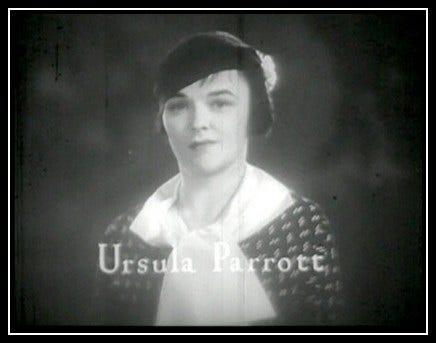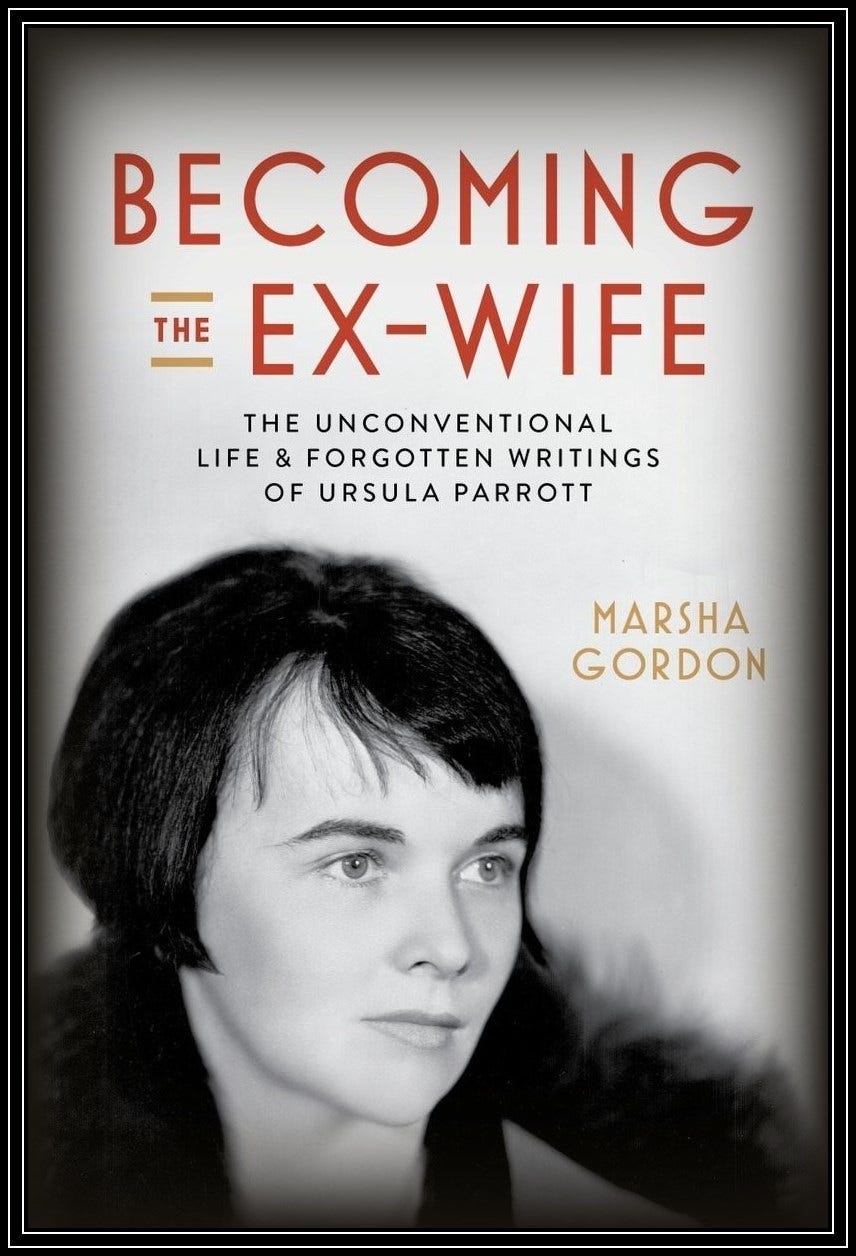"Ex-wife," the novel, By Ursula Parrott!
The Bestselling 1929 novel is as valid today as it was in 1929. It is a MUST read for any woman with the experience to understand the challenges of simply being and surviving as a woman.
During my regular visits to Goodreads, and my various excursions into and down the dangerous rabbit hole of Google, which I often call The Oracle of the World, I recently found myself introduced to the 1929 novel, Ex-wife, by Ursula Parrot. After reading a description of the book, I found I became immediately compelled to locate a copy, which I was able to do, buying a pristine copy from Abe Books for the modest sum of only $37, plus postage.
By purchasing no less than two gorgeous copies of Ex-wife, (sometimes I’ll do that) one 1929 first edition, sixth printing, and another 1930 edition, I was introduced to the amazing writing and by extension the life of Ursula Parrott, (also a graduate of Radcliffe College—see photo above). As a result, I have found myself fascinated by Parrott’s unusually daring and independently lived, life.
She was the wife of the journalist Lindsay Parrott, who would also pen a novel, (his became a retort of sorts to her novel Ex-wife) with his novel being given the revealing title Ex-husband. Now, my next challenge is to locate a copy of that book. But clearly, I have found myself quickly drawn into her life, and all that Parrott accomplished and survived.
Lindsay’s novel, Ex-husband also allegedly went into many reprint editions as Ursula Parrott’s bestselling novel Ex-wife would. It will be interesting to experience the tone of the husband’s book and why Lindsey Parrott wrote it. Any reasonable reader or observer can see a couple who were more than willing to publicly savage each other, even as Ursula Parrott raised their son, or attempted to raise their son, alone.
What makes the novel Ex-wife, so important is how it captures a time, an era which was often populated by stiff, wordy novels that did little to show the way people really actually lived, let alone the more natural, informal American English they used.
Most antique and vintage novels of the early part of the 1900’s are sentimental rather tedious stories that detail the “sins of the flesh” along with the importance of religion and living staid and conformist lives.
From my large collection of Antique and Vintage American and English novels, which I began collecting at the age of nineteen in 1985 and many which I did in fact read, I learned a lot about these kinds of historically significant, “time-capsule” novels.
Namely, I learned about the women protagonists, and how they are depicted as typically serving the needs of men, or other family members, while ignoring their own needs, aspirations and/or ambitions. The lead female characters often strive for a kind of saintliness which is achieved by selflessly serving others, while depriving themselves in every conceivable way, even going so far as depriving themselves of adequate daily nourishment.
Ex-wife is an unusual novel and Ursula Parrott was an equally unusual woman who lived the life she wanted. Her 1929 novel defied the writing conventions of the time in a brazen and aggressive way, particularly for a woman writer. Parrot earned huge sums of money, into the millions by today’s standards as a working writer which she then squandered on her lovers and friends. Parrott would die penniless in a charity ward in NY at the age of only 58, felled by insidious cancer and the ravages of long-term alcoholism.
Fortunately for any woman (or man) who wants to read more about the incredible and tragic life of Ursula Parrott, readers will have that opportunity when the one biography of Parrott comes out in 2023, by Marsha Gordon, a book entitled Becoming the Ex-wife.
I personally cannot wait to get my hands on this new biography. The title is revealing, because of the nature that Parrott was eventually forgotten in American literary circles. At this point, in 2022, this incredibly talented and seasoned writer needs to be rediscovered and celebrated. The new biography comes out in 2023, written by university professor and writer, Marsha Gordon.
In terms of her career, Parrott became a prolific writer, and published several novels, and essays and articles, including screenplays for Hollywood before her 35th birthday. Of her novels, titles include such names as, Strangers May Kiss, which I just recently purchased. Others are, The Tumult and the Shouting, Next Time We Love, and the short story, Left Over Ladies, which then became a 1931 Hollywood film. Clearly, just from the salacious titles, the idea of free love, hedonism and pleasure seeking are blatantly revealed as topics in her writing.
There was also her book Love Affair, which became a 1932 film, and There’s Always Tomorrow, which became a 1956 film. All in all, Parrott wrote 22 books, 50 stories, and four screenplays.
Despite basically abandoning her only son, Marc when he was an infant, to the care of her father and her sister, she reunited with him when he was seven and then spent decades working hard to earn enough money for him to receive a good education and to provide for him, with people claiming that she “doted on him” for the remainder of her life.
An excellent bibliography was written in July of 1999, by Susan Westall, as a masters research project in the completion of a masters degree. The Westall document was a truly ambitious project, but one that would provide pertinent information on the vast body of Parrott’s work and help others to write about her. It must have taken a great deal of tedious research and work to find all the books Parrot had written and compile all the necessary bibliographical information.
The truest reality is that women’s writing is often overlooked and disregarded, even today. I myself have experienced this disappointing reality. But when we find a powerful and genuinely unique woman’s voice, such as with writer and novelist Ursula Parrott, who was one of the few commercially successful women writers of early America, we need to do all we can to document, and preserve what is left of that voice.
And we further need to celebrate that voice.
~Theresa Griffin Kennedy






